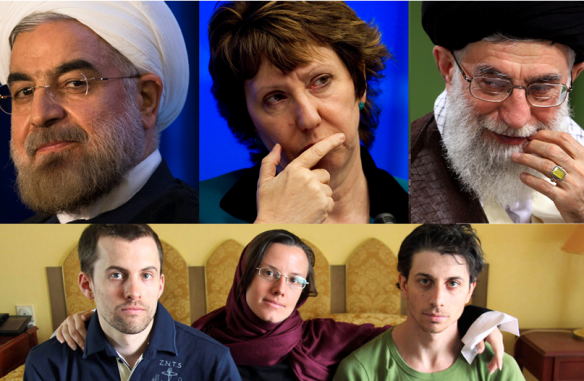Should human rights be linked to the nuclear discussions between the West and Iran? Here are three different perspectives…
“Human Rights are Internal (period)”.
In general, the “old boys” in Tehran don’t want linkage just as they don’t want any external interference on anything. Since the regime is responsible for isolating Iran and upholding strict Sha’aria laws which are the backbone for the horrid state of human rights in Iran, all “problems” are deemed internal and are not open to criticism.
The “regime” is a very general description for the Iranian leaders who want to uphold the status quo of ruling the Iranian people in a manner that seems incompatible to democracy. These include Supreme Leader Khamenei himself, as well as his minions of mullahs and IRGC generals.
These leaders are uncomfortable with any discussions that might lead to compromise and loss of face and are the first to negate bundling any of these together, eagerly looking for excuses to pull the hand breaks at the smallest sign of weakness.
“Human Rights are Internal, but…”
President Rouhani foreign policy is a testament of his efforts to change Iran’s relationship with the world. He and Foreign Minister Zarif are definitely a part of the regime in that they do not feel comfortable with any concessions to Iran’s power but they are Westernized enough to understand that without concessions, a deal with the West will be impossible.
Every agreement with the P5+1 on the nuclear issue that could be construed as a concession was followed immediately with idealized descriptions of loopholes in order to soothe the ruffled feathers of the suspicious regime leaders.
Both Rouhani and Zarif might be willing to concede that the state of human rights in Iran could be improved but are not ready to confront the regime in order to do so. They too definitely do not want linkage with human rights on any level because they know too well that their chances of changing the regime’s stance on Sha’aria laws are next to impossible.
Human Rights Linkage is Key to Success
We believe that in order for Tehran to truly stand behind a nuclear deal, it must let go of all the laws, norms and aspirations that lead to Iran’s isolation in the first place. As long as Iran is isolated in any of its paths, its path to militarizing its nuclear program will always remain and any nuclear deal is simply a temporary testament of goodwill and a far cry from the guarantee it is meant to be.
As such, any linkage between the nuclear issue and other symptoms of the regime’s hardline strategy is not an option but a necessity.





